The way a product is delivered and experienced plays a major role in customer satisfaction and long-term growth. A smooth process allows customers to receive their files while letting you focus on creating more content rather than handling transactions manually.
Some digital creators need a simple way to sell one-time downloads, while others require a system for ongoing access, memberships, or structured learning experiences.
Choosing the right fit depends on the type of digital products you sell and how you plan to manage them.
In this article, we will compare the best platforms for selling digital downloads based on features, pricing, and ease of use. We will explore platforms designed for one-time sales, memberships, and online courses to help you choose the best fit for your business.
How Selling Digital Products Can Help You Earn More
Selling digital downloads is one of the easiest ways to start an online business with low costs and unlimited earning potential.
If you sell online courses or provide high-quality digital assets, you can reach a global audience without the overhead expenses of traditional businesses.
Here are a few popular types of digital products you can sell:
- E-books: Perfect for authors, educators, and coaches
- Design templates: Used by graphic designers and creatives
- Music and sound effects: Ideal for musicians and content creators
- Online courses: A creative market for experts in any niche
- Printables: Checklists, planners, and worksheets
- Software and apps: Programs or utilities catering to specific needs
One of the biggest advantages of digital downloads is the low startup and operational costs. You don’t have to worry about expenses like manufacturing, storage, or shipping. You'll only need to create once and sell indefinitely, which makes them a reliable source of recurring income.
Customers love convenience, and digital downloads offer exactly that. With automated delivery systems, your buyers receive their products instantly after making a purchase.
Is this convincing you now to sell digital products?
Before getting started, you need the right platform to host and sell your digital products. Not all platforms are the same, and choosing the best one depends on your needs.
Read on to discover the best platform to sell your digital downloads and monetize your expertise.
8 Best Platforms to Sell Digital Downloads
Many platforms are better suited for specific types of digital products, so choosing one that aligns with your needs will help speed up sales and customer experience.
Some also cater to beginners looking for a simple storefront, while others provide advanced features for scaling businesses. Here are the best platforms for selling digital downloads that you might consider:
1. CustomerHub
Selling digital products should be simple, scalable, and stress-free. However, not all platforms are built to support coaches, consultants, and course creators.
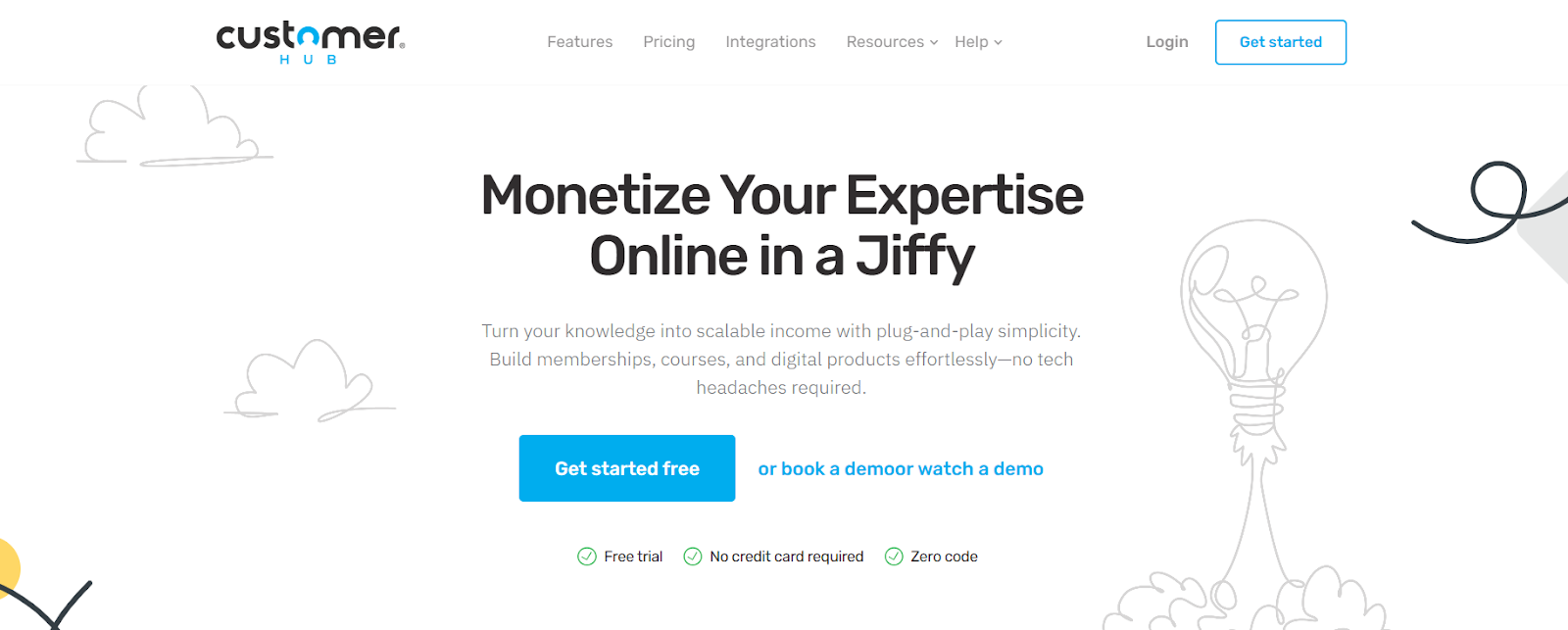
Unlike marketplaces or complex e-commerce platforms, CustomerHub provides a plug-and-play solution designed specifically for knowledge entrepreneurs.
Here’s why CustomerHub is the best platform to sell digital downloads, memberships, and courses.
Effortless Digital Product Management
With CustomerHub, you can sell, organize, and deliver your products from a single, user-friendly dashboard without complicated setups.
You can upload PDFs, videos, templates, or other digital assets and let the platform automate access control and content delivery. If you're selling one-time downloads or gated membership content, you stay in control while CustomerHub manages the customer experience.
No-Code Customization for a Branded Experience
Unlike e-learning platforms that require complicated plugins or coding, CustomerHub makes it easy to create a branded storefront that matches your business.
You can upload your logo, set custom colors, and connect your domain for a professional experience.

Plus, with mobile optimization, your customers can access their downloads, courses, or memberships from any device.
Marketing & Customer Engagement Tools
Selling digital products is just the beginning. CustomerHub integrates with leading email marketing platforms and provides built-in customer engagement tools to help you grow and retain your audience.
You can automate follow-ups through your preferred email provider, keep members engaged with a distraction-free private customer feed, and track real-time sales insights to optimize your offers.
Secure, Flexible Payment Processing
A smooth checkout experience keeps customers happy and conversions high.
CustomerHub integrates with Stripe and connects with hundreds of other payment processors via Zapier. You can accept one-time payments or recurring billing without additional transaction fees from CustomerHub.
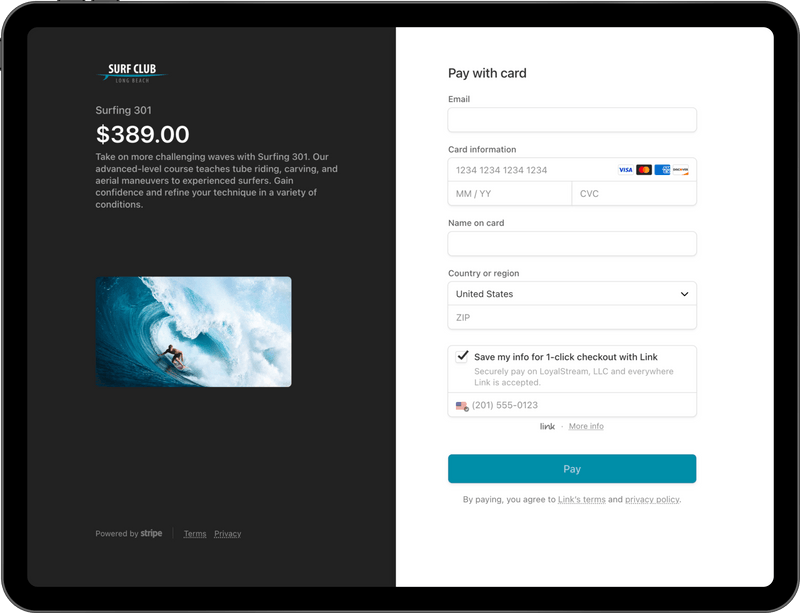
Membership renewals, cancellations, and payment tracking happen automatically, so you don’t have to chase payments or manually revoke access.
Personalized Support & Hassle-Free Setup
Big platforms leave you figuring things out on your own, but CustomerHub provides responsive support to help you succeed.

You'll get unlimited chat assistance, access a step-by-step knowledge base, or opt for a Done-for-You setup to launch your digital store without stress. From onboarding to scaling, expert help is always available.
Scale Without the Stress
As your business grows, you need a platform that keeps up. CustomerHub eliminates hidden fees, transaction costs, and platform restrictions, which gives you full control over your revenue.
You won't need to juggle multiple platforms as everything from content delivery to payment processing is built in. With Zapier integration, you can automate workflows and connect with over 7,000+ tools to simplify your business.
CustomerHub Pricing
CustomerHub gives you a 14-day free trial to test all features risk-free. You'll get content delivery, automated payments, and unlimited access to products and users without hidden fees.
After the trial, it costs $79 per month, covering everything you need to sell, manage, and grow. Unlike other platforms that charge extra for features, CustomerHub includes it all in one simple plan. No upgrades, just a complete system for your digital business.
Start selling without restrictions. Sign up for your free trial today!
2. Podia
Podia is another platform for selling digital products, online courses, and managing membership websites. It is suitable for creators, educators, and entrepreneurs who want a simple and professional way to sell without dealing with multiple integrations.

Key Features
- Platform for digital downloads, memberships, and courses
- Unlimited storage and bandwidth
- No transaction fees on paid plans
- Built-in email marketing and affiliate program
Pricing
- The Mover plan costs $39 per month and includes a 5% transaction fee on sales
- The Shaker plan is $89 per month with no transaction fees, ideal for higher-volume sellers
Both plans come with Podia Email, a built-in email marketing tool that includes email designs, automation features, and sales analytics at no extra cost.
3. Gumroad
Gumroad is designed for creators, artists, and small businesses who want a simple way to sell digital products without managing a full e-commerce website.
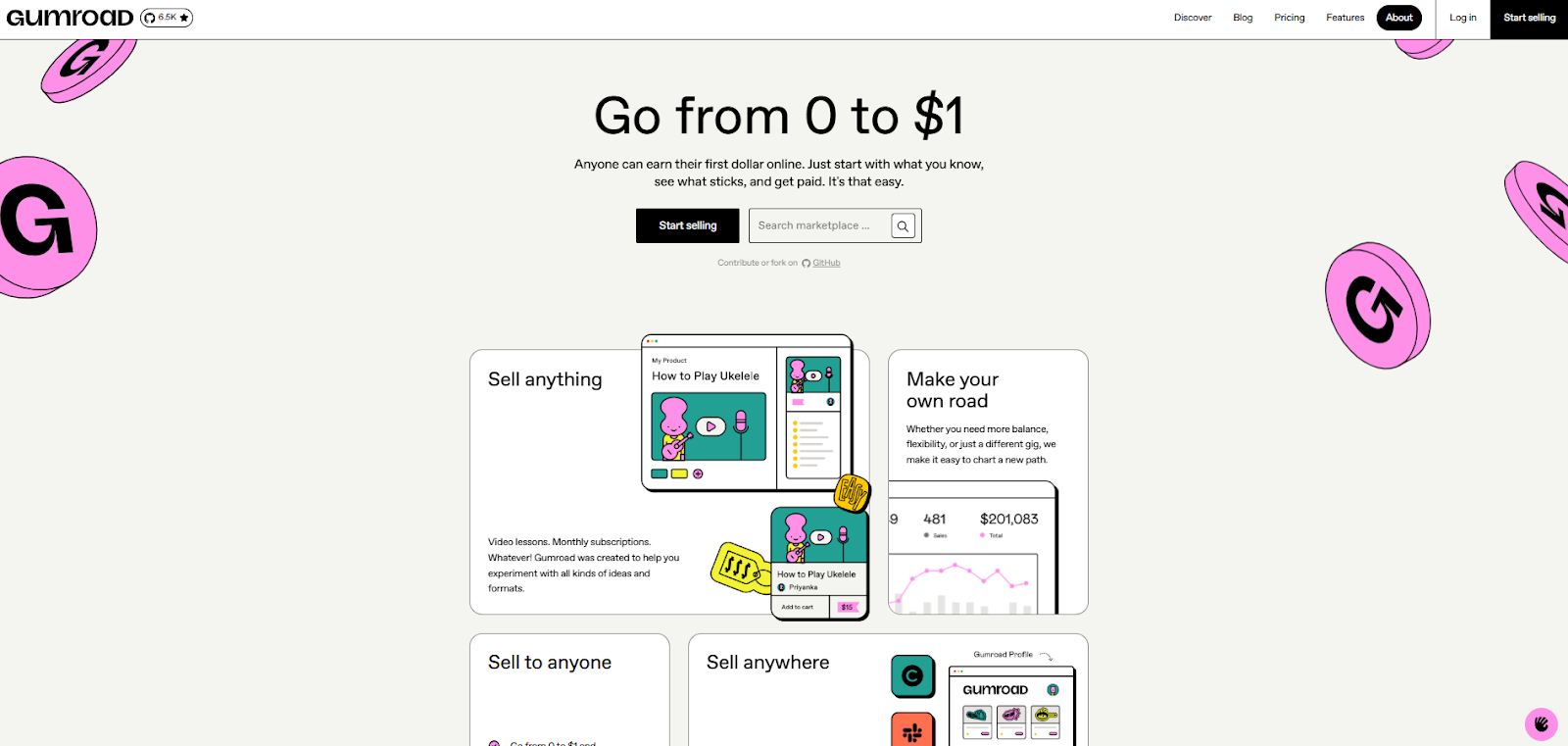
This platform lets you sell through product links, social media, or a minimal storefront. It also includes built-in marketing tools, secure file delivery, and flexible pricing options.
Key Features
- No monthly fee, only a per-transaction fee
- Instant payouts via PayPal
- License keys for selling software
- Email marketing and discount code features
- Built-in membership and subscription options
Gumroad is suitable for people who sell directly through social media, email lists, or blogs. It's also beneficial for beginners who want a free, low-maintenance selling platform.
Pricing
Gumroad takes a fee of 10% plus $0.50 per transaction for sales made through your profile or shared links.
If customers find your products through Gumroad’s Discover marketplace, the fee increases to 30% per transaction to cover the additional exposure provided by the platform.
4. Kajabi
Kajabi provides a course creation tool that allows you to develop multimedia lessons, incorporating videos, quizzes, and assessments to improve the learning experience. It also offers website customization options for designing branded websites and landing pages.
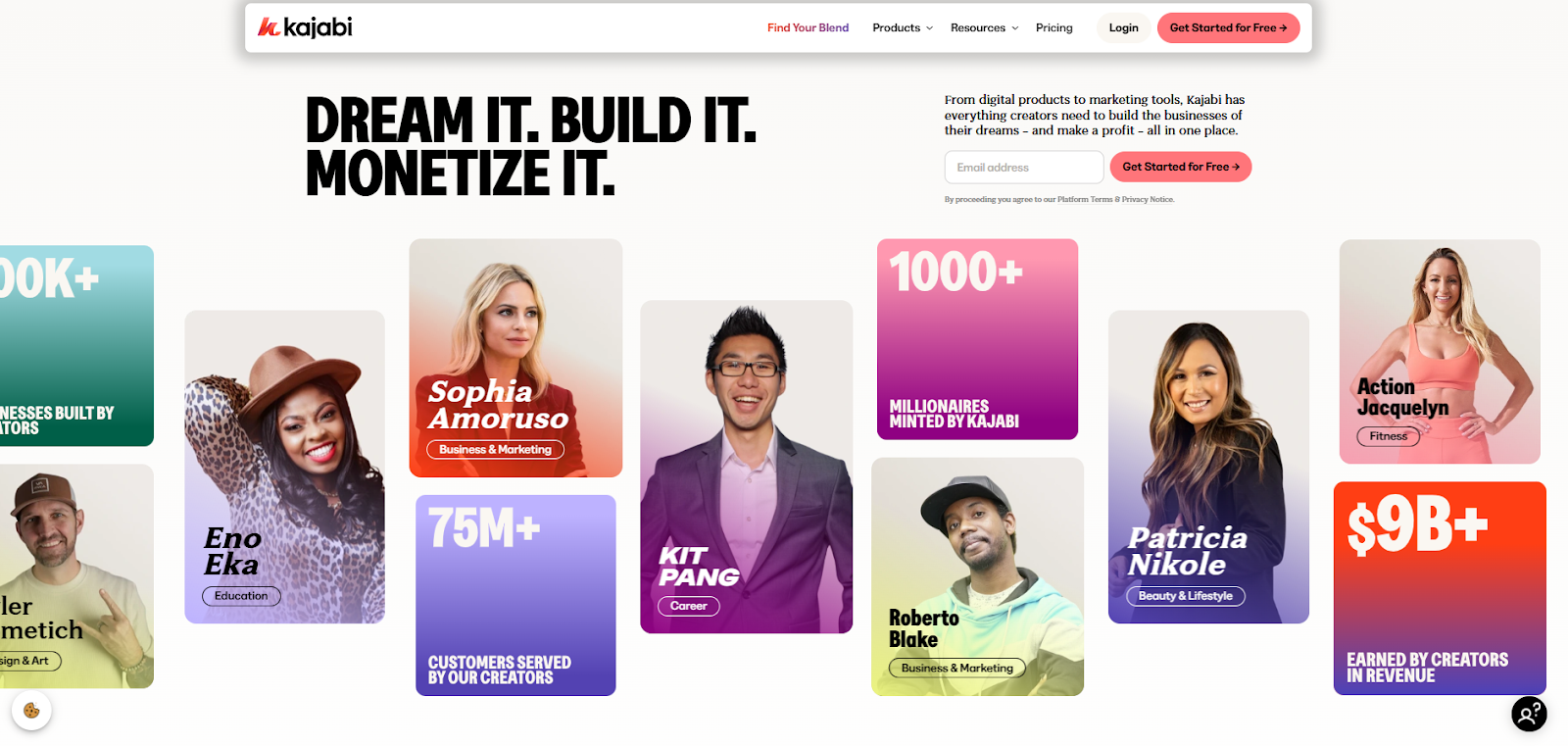
It includes features like email marketing automation, sales funnel building, and payment processing. These tools assist you in promoting your products, managing customer relationships, and handling transactions.
Key Features
- Host, sell, and deliver online courses, coaching, and gated content
- Design customizable websites and landing pages using a variety of templates
- Automate marketing with email sequences and landing pages
- Accept payments directly through the platform with integrated payment gateways
- Set up membership areas to offer exclusive content to subscribers
Kajabi is recommended if you need a complete course and membership solution with built-in marketing tools.
Pricing
- The Kickstarter plan costs $89 per month and provides the essential tools needed to start an online business.
- The Basic plan, priced at $149 per month, includes everything required to launch and manage a business.
- The Growth plan is available for $199 per month with additional features to help scale operations.
- The Pro plan, at $399 per month, is designed for experienced users who need advanced tools and premium capabilities.
5. Teachable
Teachable is a platform for creating and selling online courses, coaching programs, and digital downloads. It provides a course builder where users can upload videos, PDFs, quizzes, and other content to structure their lessons.
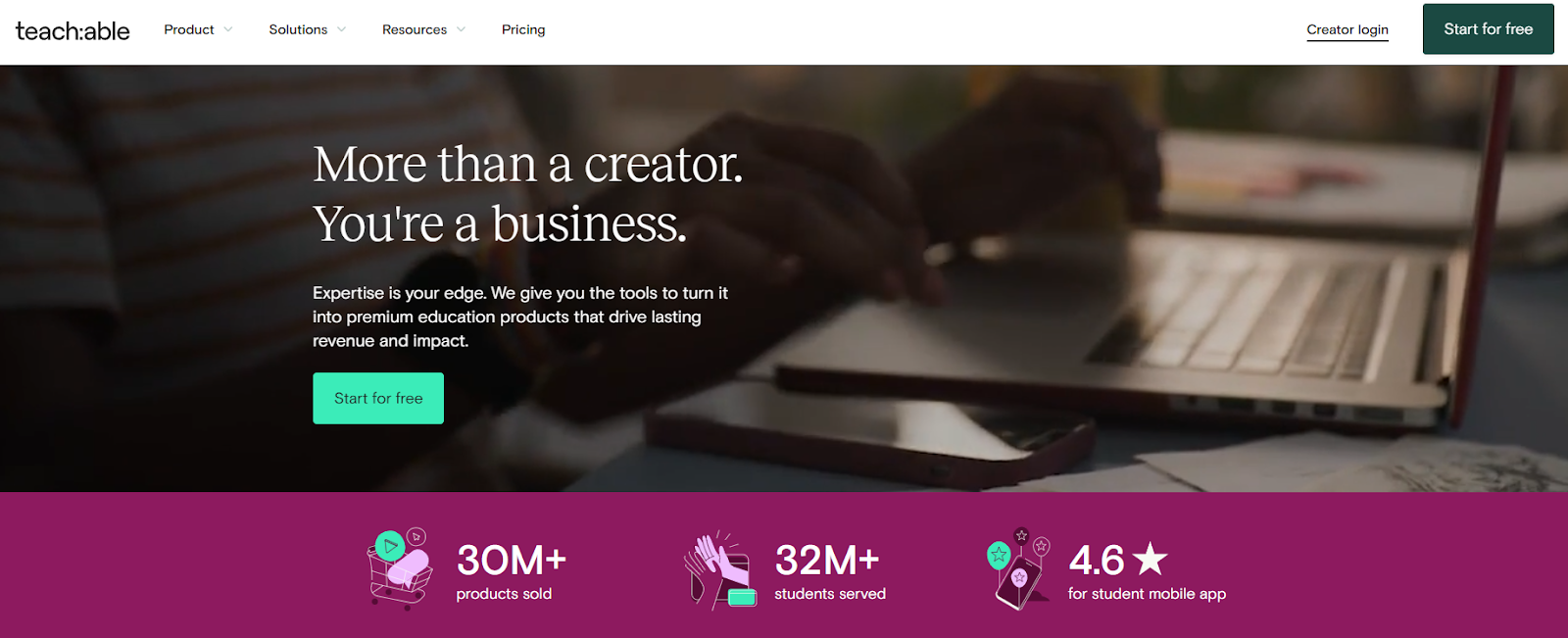
The platform also supports customizable course websites where you can design landing pages and manage student access without needing coding skills.
Key Features
- Generate course outlines, create quizzes, and automate subtitles and translations
- Attract more customers with options like Buy Now, Pay Later
- Increase global reach with tax-inclusive pricing
- Access strategies through teachable:u and participate in live events led by expert creators
- Connect with numerous popular third-party apps
- Track progress with graded quizzes and course compliance tools
Pricing
- The Starter plan, priced at $39 per month, includes essential tools and support to help creators build and launch their courses.
- The Builder plan costs $89 per month and provides advanced features designed for scaling, including additional support options.
- The Growth plan is available for $189 per month, offering more product capacity and custom user roles.
- The Advanced plan is priced at $399 and includes all Growth features along with unlimited integrations.
They also offer custom pricing with migration assistance, white-glove onboarding, and a dedicated success manager.
6. Thinkific
Thinkific is a platform built for selling online courses and digital products. It focuses on course creation and student experience rather than advanced marketing automation.
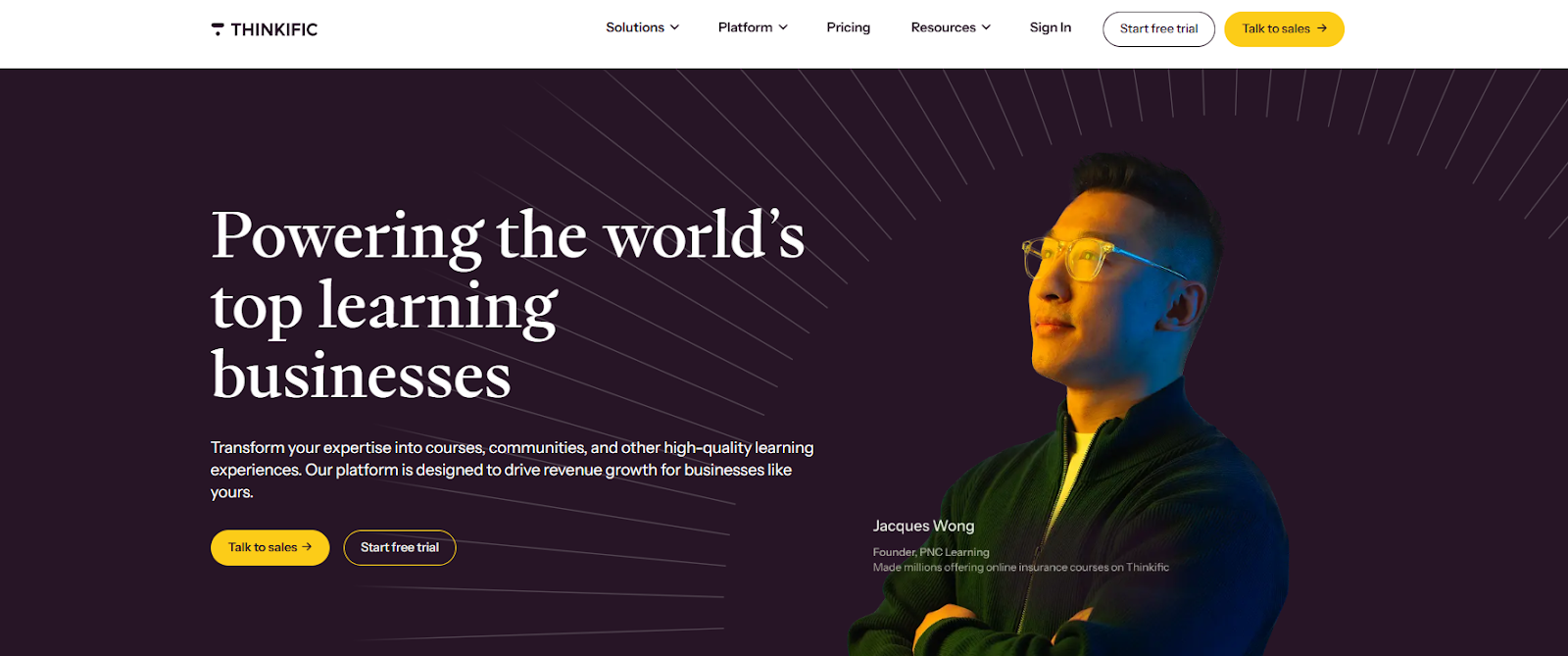
The platform supports different content formats to make it easier to organize and present educational materials in a structured way. It also integrates with email marketing tools, analytics platforms, and payment processors.
You can customize your course website with pre-built themes and support multiple pricing options, including one-time payments, subscriptions, and payment plans.
Key Features
- Create unlimited learning environments with custom domains
- Build member spaces, send notifications, and host live lessons
- Provide learners with access to courses on any device
- Offer structured courses with quizzes, assignments, and certificates
- Track learner progress, engagement, and course performance
Thinkific is suitable for course creators who prioritize customization and content delivery over built-in marketing tools.
Pricing
- The Basic plan ($49/month) includes additional features like a custom domain, email marketing integrations, and affiliate marketing tools.
- The Start plan ($99/month) adds features such as course completion certificates, live Zoom classes, and priority support.
- The Grow plan ($199/month) is designed for businesses, providing white-labeling options, advanced analytics, and extra admin accounts.
- The Thinkific Plus plan offers custom pricing and tailored support for organizations with unique requirements.
7. Membership.io
Membership.io (formerly Searchie) is a platform designed for managing online courses, memberships, and coaching programs. It offers a centralized content library where you can upload and organize videos, audio files, and documents.
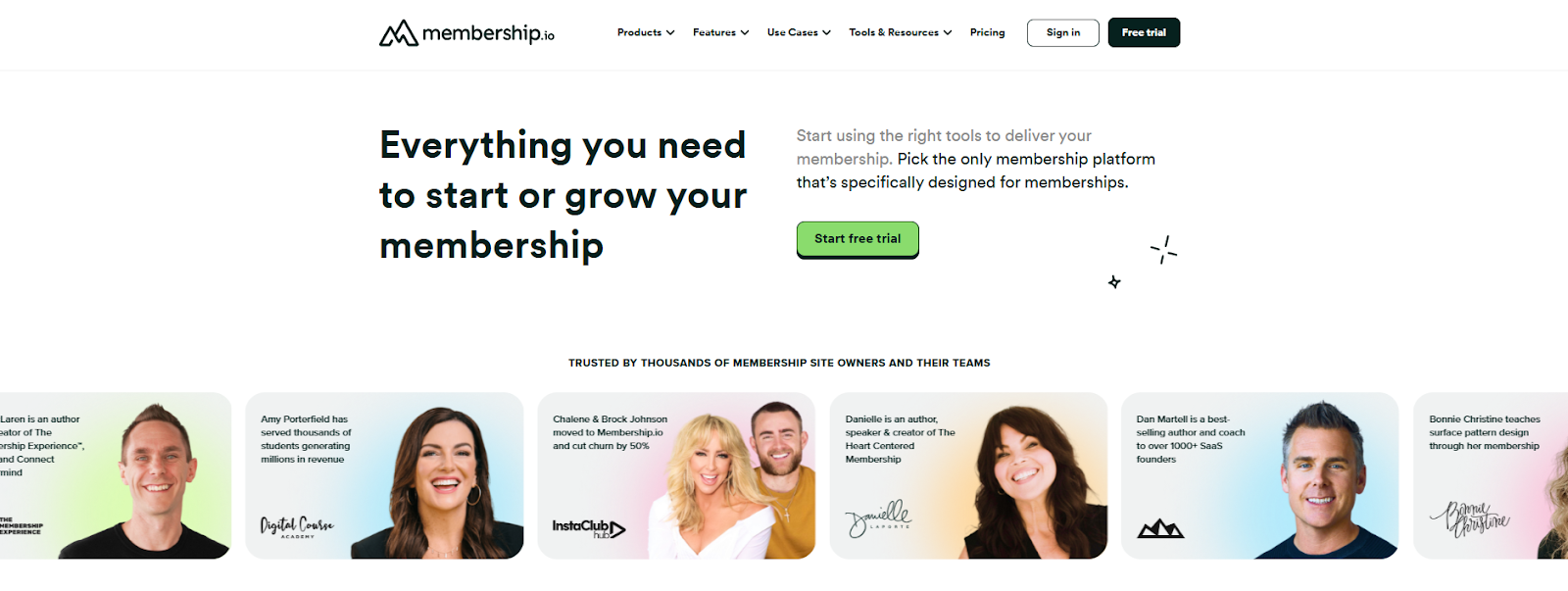
It also includes adaptive content access, which lets you customize content visibility based on member progress and attributes. Their AI-powered content management tools automate tasks such as tagging and sorting course materials.
Key Features
- Upload and organize videos, audio, and documents with automatic transcriptions
- Control visibility based on member progress and attributes
- Automate tagging, structuring, and organization of digital content
- Member directories, discussion forums, and customizable profiles
- Accept payments via Stripe and ThriveCart
- Members can view content and interact on any device
Pricing
- The Start plan, priced at $49 per month, includes all the essential tools needed to launch a membership.
- The Grow plan costs $119 per month and adds features to help build and engage a larger community.
- The Scale plan, available for $219 per month, offers full feature access along with a dedicated Customer Success Manager.
8. Shopify
Shopify is an e-commerce platform for physical and digital products. It also offers features and integrations for selling e-books, courses, templates, software, and music.
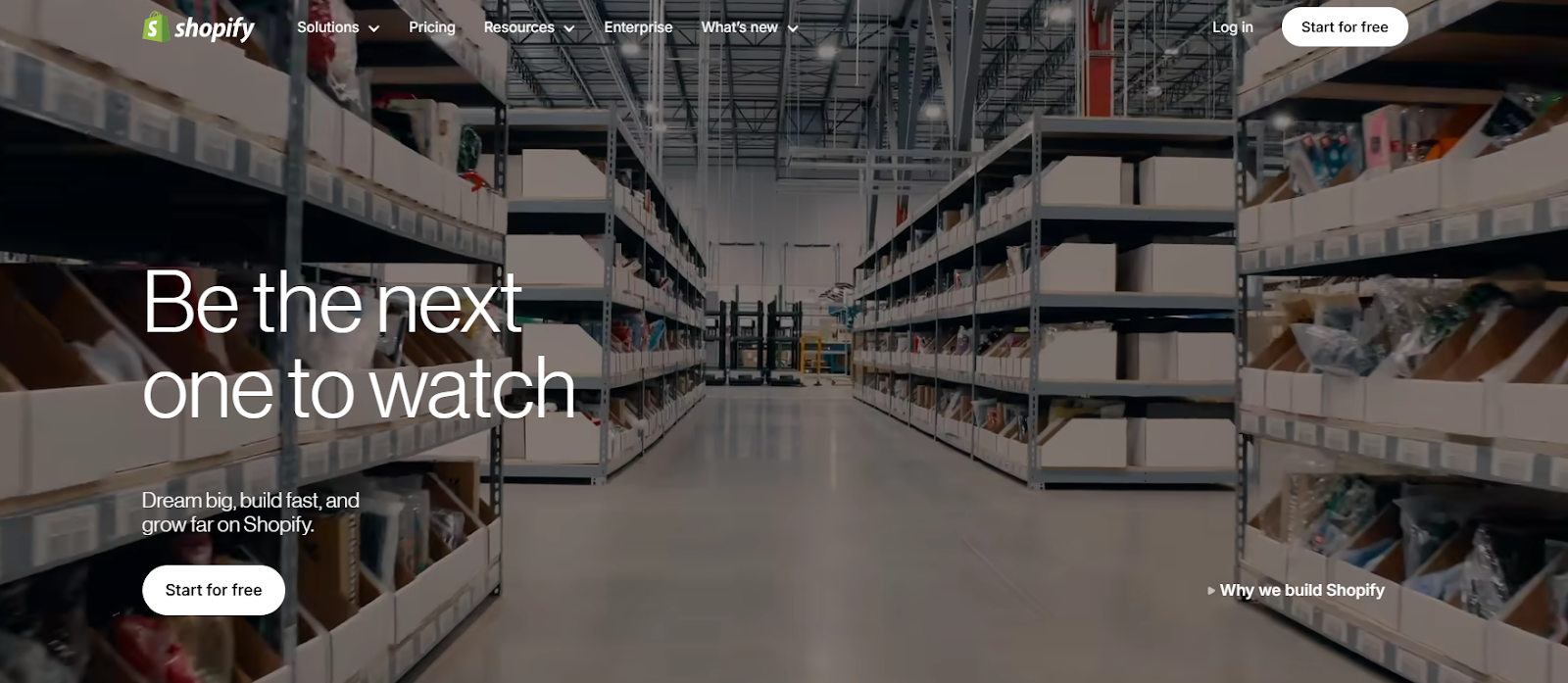
It provides a fully hosted e-commerce platform that allows you to manage digital products with ease. This platform gives you full control over your store’s branding, customization, and pricing.
Key Features
- Dedicated digital downloads app for automatic file delivery
- Multiple payment gateway options (PayPal, Stripe, Apple Pay, etc.)
- Full store customization with themes and apps
- Integration with marketing tools like email campaigns and SEO
- Secure checkout with SSL encryption
Shopify is suitable if you want full control over your storefront or if you need advanced marketing tools to drive traffic and conversions. It's also for entrepreneurs who want to integrate digital sales with physical products.
Pricing
- The Basic plan costs $39 per month and is good for solo entrepreneurs.
- The Grow plan is $105 per month and is designed for small teams.
- The Advanced plan costs $399 per month and works well for growing businesses.
- For large companies, the Shopify Plus plan starts at $2,300 per month on a three-year term..
What to Look for in a Platform for Digital Downloads
It’s important to consider the features that will help you provide a better experience for you and your potential customers.
Platforms vary in pricing, from free options with transaction fees to premium plans with flat monthly costs. Assess how much you’re willing to spend upfront and how much of your sales revenue you’re comfortable allocating to initial setup fees.
You should also evaluate any additional costs, such as hosting, payment processing fees, or premium add-ons for features like email marketing or file delivery. Your budget will determine if you prioritize low startup costs or long-term scalability.
While every digital product sales business has unique needs, these features are key to selling digital products successfully:
Payment Processing Options
It’s essential to choose a platform that integrates with secure and widely-used payment gateways to provide your customers with flexible payment options.
Some platforms, like Gumroad, handle payment processing directly through their systems, offering simplicity but fewer options to customize payment methods.
CustomerHub connects with trusted payment gateways like Stripe and PayPal. It provides you with the flexibility to offer multiple tools for payment methods without additional transaction fees.
The platform is also built to handle complex billing needs like memberships, recurring subscriptions, or one-time payments.
Customizable Storefront and Branding
Some online course platforms offer more branding and customization options than others, so it’s important to choose one that aligns with your vision.
Shopify allows for extensive customization, including custom domains, fully personalized storefront designs, and tailored checkout experiences. The platform lets you build a store that reflects your brand’s colors, logo, and tone for a professional look.
However, it often requires technical knowledge or developer support to achieve a polished result.
Gumroad also functions more like a marketplace, where your products appear alongside competitors' existing offerings. While it simplifies setup, it restricts branding control, meaning your store looks and feels similar to others on the platform.
CustomerHub lets you fully customize your membership website or digital storefront with your branding without the need for coding or complex design tools. You can use your own custom domain, upload your logo, and style your pages to maintain a consistent brand experience.
The platform is built for simplicity, so you get professional-looking pages without hiring a designer or dealing with tech headaches.
Marketing and Sales Tools
Marketing and sales strategies are essential for attracting customers, driving sales, and building long-term growth when selling digital downloads. A platform with built-in or integrated marketing features can save time and help you reach a wider audience.
Some platforms offer marketing tools, including email marketing, discount codes, abandoned cart recovery, and integrations with social media platforms.
You can increase lifetime value with CustomerHub's membership renewal reminders, exclusive offers, and private customer feeds to keep your audience engaged and buying more.
You can track sales performance, member engagement, and retention rates to refine your sales strategies.
Analytics and Reporting
Analytics help answer questions about your business. You can track which digital files are selling the most and measure conversion rates to see how many visitors become paying customers.
A good analytics tool should provide detailed analytics into your store’s performance. Some essential features include sales tracking, customer behavior reports, traffic source analysis, conversion rate monitoring, and abandoned cart reports.
For sellers offering recurring memberships or exclusive digital creations, CustomerHub provides analytics focused on subscription retention, member activity, and revenue tracking.
Understanding these metrics helps you understand customer preferences and reduce churn rates.
Strong Security Features
Since digital artwork can be easily copied or shared, you need a platform that offers secure file delivery, fraud protection, and safe payment processing. Verified account access and secure payment gateways help reduce fraudulent purchases and chargebacks.
A secure platform should provide unique, time-sensitive download links that expire after a certain number of uses or time periods. This prevents unauthorized sharing and keeps your files protected.
Third-Party Integrations
Platforms that support multiple tools give you the flexibility to customize your workflows, optimize sales funnels, and automate repetitive tasks. You can handle higher traffic and international sales without requiring additional manual work.
Secure and flexible payment processing is essential for converting visitors into paying customers. Most platforms integrate with PayPal and Stripe to support credit and debit card payments.
Some platforms also allow cryptocurrency payments and alternative options like Apple Pay and Google Pay to make transactions faster for mobile shoppers.
Evaluate Scalability
A platform should handle increased traffic, larger product catalogs, and higher online sales volumes without limitations or skyrocketing fees.
An ecommerce platform like Shopify is designed for online stores that sell physical or digital products. They offer flexible plans, advanced integrations, and tools to support growth. But scaling can become costly as you upgrade plans or add third-party apps.
If your business is centered around memberships, courses, or selling subscriptions, you need a platform that easily scales with your audience without restrictive limits on members or content.
CustomerHub lets you expand your memberships, digital products, and recurring revenue without hidden costs. You can connect with email marketing tools, CRMs, and over 7,000 apps to automate workflows as your business grows.
Tips for Selling Digital Downloads Successfully
Selling digital downloads requires a strategic approach to stand out. Below are a few tips to help you maximize your sales, build customer loyalty, and grow your business over time.
Create High-Quality Products
Before creating a digital product, research what your target audience is looking for. Check best-selling items on digital platforms to see what’s in demand.
If you’re selling templates, digital art, or courses, make sure they solve a problem or add real value. The more useful your product is, the more likely customers will buy and recommend it.
For long-term success, update your digital products regularly. If you sell guides, website templates, or software, refresh content to reflect current trends. Adding new versions or bonus materials can boost customer satisfaction and increase repeat sales.
Optimize Product Listings
Your product title should be descriptive, easy to read, and include relevant keywords. Avoid vague or overly creative titles that don’t clearly explain what you're selling.
A great description tells buyers what they’re getting and why they need it. Make your description easy to scan by using short paragraphs, bullet points, and bold text for key details.
Since digital products are intangible, visuals are the only way to showcase your product. You should use high-quality visuals or mockups that clearly display your product’s content and style.
Giving customers more flexibility can set your product apart. If possible, include multiple file types (e.g., PDF, PNG, PSD for templates) so buyers can choose the one that works best for them.
Use Discounts and Promotions
Since digital products have no inventory costs, you have more flexibility to run promotions without losing profit margins. Examples of effective time-based promotions:
- Flash sales (e.g., “50% off for the next 24 hours!”).
- Seasonal discounts (e.g., “Back-to-School Sale – 20% off all digital planners!”).
- Holiday sales (e.g., “Black Friday – Buy 1, Get 1 Free on all templates!”).
You should announce these promotions via email marketing, social media, and pop-ups on your store to maximize reach.
Bundling multiple digital products at a discounted price increases perceived value and encourages customers to buy more. You can also create tiered pricing bundles, where customers get a bigger discount when they buy more products at once.
Experiment With Pricing
Try selling your product at one price for a few weeks, then slightly increase or decrease it to see how it affects sales. If raising the price doesn’t impact conversions, it’s a sign that customers see enough value to pay more.
Some customers are willing to pay more for extra features, while others prefer a lower-cost version. Offering different pricing tiers can help capture both markets.
Example of a digital planner:
- Basic – $10 (Just the planner)
- Premium – $20 (Planner + extra templates)
- Full Bundle – $30 (Planner + digital templates + bonus stickers)
Instead of one-time purchases, some customers prefer ongoing access to digital content. A plug-and-play platform like CustomerHub allows you to offer memberships or subscriptions.
A subscription model keeps revenue steady and encourages long-term existing customer relationships.
Build an Engaged Community
Instead of focusing only on one-time buyers, an online community helps turn customers into long-term supporters. Social media groups can be distracting and limit customization.
However, CustomerHub gives you a private, branded space where customers can interact and stay connected with your brand. With private member feeds, discussions, and community features, this platform makes it easy to build meaningful engagement.
To keep your community active, you need to interact with customers consistently. Respond to questions, start discussions, and share valuable content related to your products. Posting tips, tutorials, and behind-the-scenes updates also makes customers feel connected to your brand.
Turn One-Time Buyers Into Long-Term Customers With CustomerHub
Many platforms allow you to sell digital downloads, but not all of them are built for long-term success.
Some focus only on one-time transactions, which leaves you to figure out customer retention and engagement on your own. This can slow down your business, create unnecessary work, and make it harder to scale.
CustomerHub is designed to solve these challenges. It lets you build an organized, professional space where customers can access online courses, memberships, and high-quality digital assets.
With automated content delivery, progress tracking, and subscription management, you don’t have to worry about handling everything manually. The platform helps you keep customers engaged, encourage repeat purchases, and create a steady revenue stream.
If you’re looking for more than just a checkout page, CustomerHub is the best platform to sell digital downloads. Instead of chasing new buyers constantly, you can focus on delivering value and building long-term relationships.

Start your 14-day free trial and see how CustomerHub can impact your digital business!
FAQs About the Best Platform to Sell Digital Downloads
What is the best platform to sell digital downloads?
The best platform depends on what you’re selling and how much control you want over your store. Shopify is great for those who want a fully branded online storefront with built-in marketing tools.
Gumroad is a good option for creators who want a simple way to sell directly through social media.
CustomerHub is one of the best choices for easy digital downloads like digital courses, memberships, and exclusive gated content. It allows you to create a private community where customers can gain access to premium material on a recurring basis.
If you’re focused on subscriptions or online courses, CustomerHub provides a more structured experience than a traditional own site, helping you grow a thriving business through repeat customers and long-term engagement.
Is selling digital downloads profitable?
Yes, digital downloads can be profitable since there are no shipping or inventory costs. Platforms like Etsy and Creative Market offer visibility, but owning your own sales channel lets you keep more profit.
Building your own website helps you maintain full control of branding, analytics, and the customer experience, giving you better opportunities for scalability and revenue growth.
What is the easiest way to sell a digital download?
If you’re focused on subscriptions or online courses, CustomerHub provides a more structured experience than your own site. It helps you grow a thriving business through repeat customers and long-term engagement.
Using your own domain with a clean layout and clear product descriptions can increase conversion rates.
Do I need an LLC to sell digital products?
A limited liability company (LLC) isn’t required to start, but it can help protect your assets and establish credibility with customers. If you're offering things like online courses, templates, or selling ebooks, it’s smart to plan for growth.
Even if you begin with an existing website or hobby blog, transitioning to a platform with a reliable hosting account ensures stability when you’re ready to start selling products online.
Over time, your product offerings may expand into more complex categories like tutorials, presets, or even digital code work. Therefore, it’s helpful to build on a solid legal and technical foundation from the start.






